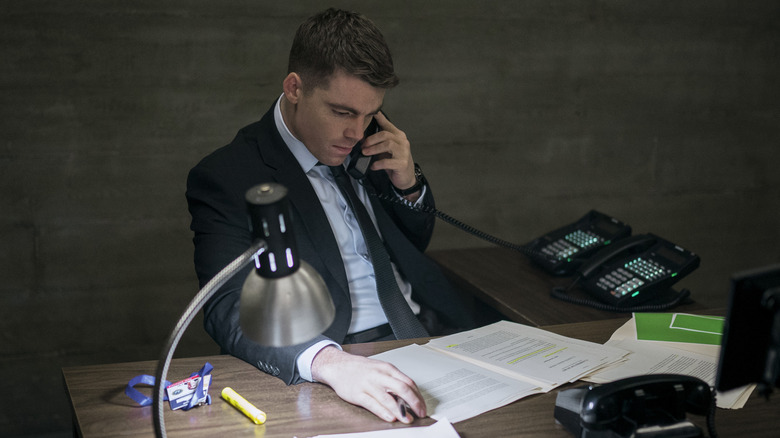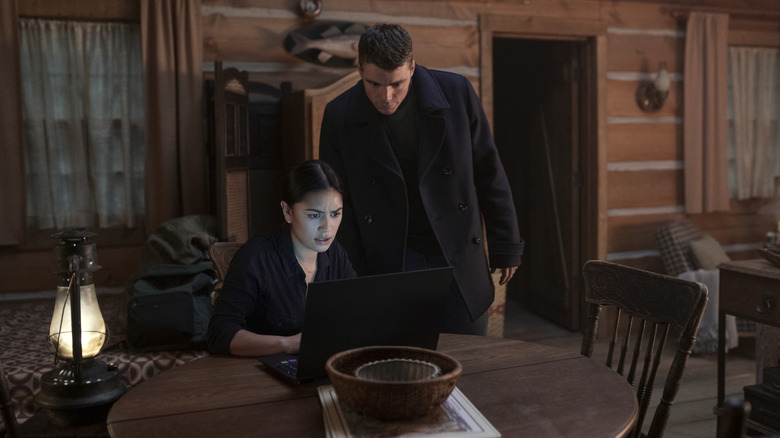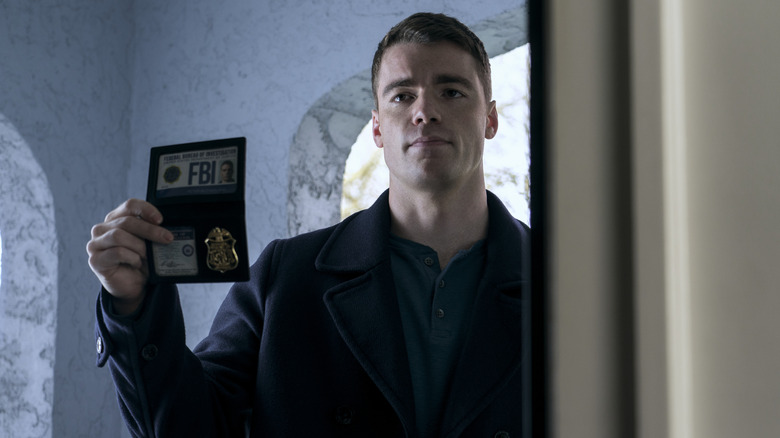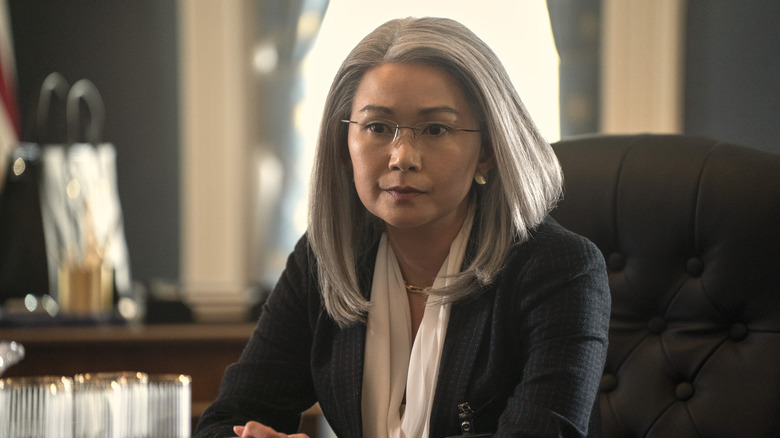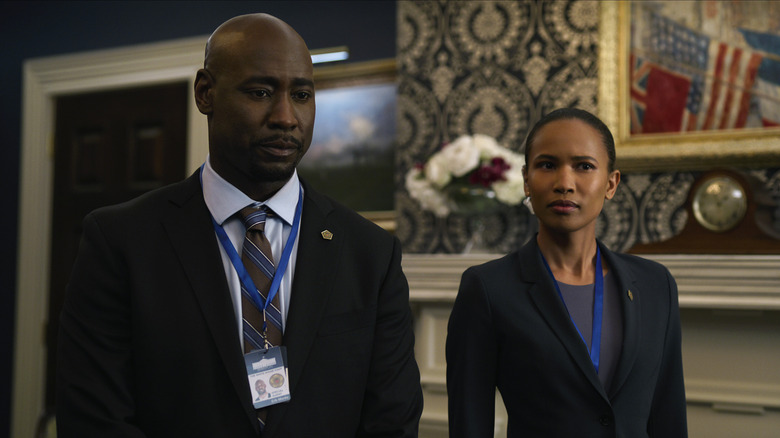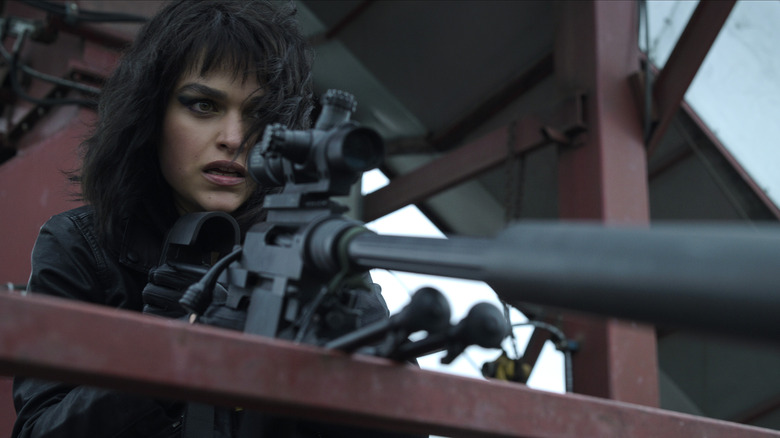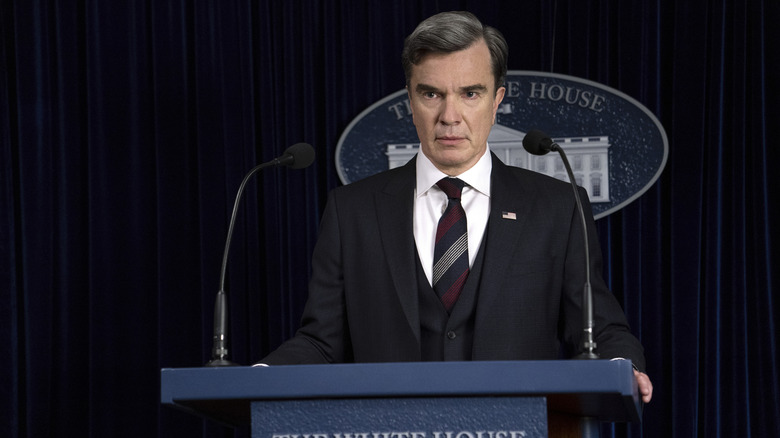The Shield Creator Shawn Ryan On His New Series, The Night Agent [Exclusive Interview]
This post contains spoilers for "The Night Agent."
Netflix's newest original series, "The Night Agent," is based on the 2019 novel by Matthew Quirk. A "24"-esque thriller, both political and action-oriented, the show centers on FBI Agent Peter Sutherland (Gabriel Basso), whose father was accused of selling state secrets to the Russian government. Unfortunately, the stench has never left his son, not even after Peter foiled a terrorist attack on Washington DC's metro train. He's currently stuck in a dead-end job as a "Night Agent" — he has to sit at a desk in the White House basement next to a phone that never rings. Until one day, it does.
Former tech CEO Rose Larkin (Luciane Buchanan) calls Peter after narrowly escaping assassins who killed her aunt and uncle. Unbeknownst to her, they were FBI assets in an active investigation. Unsure who to trust, Peter must keep Rose alive and unravel a conspiracy that originates inside the White House. Before the premiere of "The Night Agent," I spoke with series' creator Shawn Ryan, best known as the creator of "The Shield." Both that show and "The Night Agent" are about rotten systems of American government, but Peter is much more idealistic than "The Shield" protagonist Vic Mackey (Michael Chiklis).
Ryan discussed how his experiences on network TV shaped his approach to "The Night Agent" and how/why he made changes from the novel to better tell his story.
Note: This interview has been lightly edited for clarity and brevity.
Making a show for Netflix is a different experience for the viewer
Since you're a writer who came up through network TV, how does making a TV series for Netflix compare with making one for FX?
Yeah, listen, I'm very grateful that I learned my bones on long-running seasons of network TV. You really learn story-breaking principles there in a big way.
But when you do go to make a show for Netflix, it is a different experience for the viewer and I think you have to be aware of that experience when you're making the show. So you know that multiple episodes could be watched at once, the binge, right? So one of the things, when I was making "The Shield," was there was always [a] concern, "Will people remember this thing that happened five episodes ago?" Well here, five episodes ago on Netflix might have been yesterday, so you don't have to worry about that as much.
You're not building towards these commercial breaks in the middle of the episodes, but it is good to have that muscle that you like, "Hey, it's been a little while since we've really jolted the audience with something, let's find a moment here." But then I would say that you're really building over the course of the episode on Netflix to something where that last scene, hopefully, makes you go, "Oh my God." It makes you sort of reconsider what you just watched, and makes you think, "I've got to go to work in eight hours, but I got to watch one more episode."
What is that thing that you can get the audience to be like, "I just love this show too much, I've got to watch more?" Or "Tomorrow I was thinking about going bowling, but no, I'm not going to go bowling. I'm going to come home and finish this because I've got to finish it tomorrow." Those are the kinds of things you think of as you're constructing a season for Netflix, I believe.
There's actually a beginning, a middle, and an end
There's a lot in the discourse that in the age of streaming TV, it's starting to feel more like long movies versus episode-by-episode stories. Do you agree? And do you feel that's a change for the better or for the worse?
I don't agree. I believe — and once again, this may be my broadcast network origins coming out — I believe that every episode should have its own feel and rhythm. Yes, the episodes want to spring together to make a greater narrative, a greater quilt so to speak, but each episode can be their own thing and say their own piece. And I think we worked hard to make the episodes distinct from each other, and to make the episodes have a beginning, middle, and end.
For instance, I don't think people would be as satisfied if they watch this show starting in the middle of an episode, watching an ending in the middle of an episode, going to bed, the next day picking up in the middle of the episode. Do you know what I mean? I think the most satisfying way to watch this is to watch a whole episode, and that there's a beginning, a middle, and an end to that episode.
Yes, it leaves us in a place where, okay, another episode's going to come along. But we spend a lot of time ... we open our episodes on these flashbacks to different characters that give you perspective. Usually, there's something important happening for the character that we show in the flashback, in this episode. So I still believe in the sanctity of the singular episode of TV. And I think that's applicable even on a place like Netflix.
On adapting existing material
This is your first adaptation of a preexisting work into a TV series, correct?
Yeah, I've tried before, but not successfully. So it's not that I haven't tried before, but this is the first one. This is the first book adaptation that I've done that has come to screen.
How is adapting a work different than making up one from scratch?
I'd say it's easier at the beginning, and then harder at the middle and the end. Easier at the beginning in that you have a starting point. You have characters, and you have some plot that you can say, "Okay, starting point." When you're trying to come up with a new idea, like "The Shield," or "Timeless," and you don't really have anything, it's very daunting at the beginning.
The benefit when you're not adapting is that you just have your imagination. You can go wherever you want. When you're doing an adaptation, you feel a certain obligation, understandably, to stay within certain lines that the piece — in this case, the book that you're adapting from — stays in. There's a pressure there, and sometimes you have to release yourself from that pressure to say, "Well, I've got to escape what the book did to do what's best for the TV show." So in the middle and later stages, I think it can be a little harder in that regard.
In our case, we deviated a lot from the book, especially in later episodes, and I was worried a little bit, "Well, how would Matthew Quirk, who's the author of the book, react to that?" And I was very relieved, I actually saw him last night at the premiere party, and his wife had screened all 10 episodes that Netflix made available to them and he and his wife were so thrilled by it. He knew that so much of what was in the book was core and key to what we did. He also loved the changes and the additions and we had this whole world with the vice president's daughter that's not in the book, all this sort of stuff.
So I was very gratified and relieved that at least the author thought that we still honored his book while at the same time making a lot of changes.
'Well, he's got to be the guy'
In terms of some original characters you added, Eric Monks (D.B. Woodside) and Chelsea Arrington (Fola Evans-Akingbola), I was kind of getting a bit of a Dutch (Jay Karnes) and Claudette (CCH Pounder) from "The Shield" dynamic with their partnership. Were you drawing on those two when writing?
A little bit. I would say the difference there is that Claudette was always the senior detective. In this case, what I liked was the age difference where the younger agent was the one in charge.
Now interestingly, when I wrote those roles, Chelsea was always intended to be Black, but Eric was going to be white. And I liked the idea of telling a story about an older white man working under the authority of a younger Black woman. But we always tend to be open in the casting process, and we don't want to be too specific.
So we opened up the cast to everyone, and when I saw D.B. come in and audition, I was just like, "Well, he's got to be the guy." So then we had to change a little bit and adjust the script. So it was less a race thing, of white older guy, younger Black woman. And while these are two Black people who have come up these ranks, now it's a little bit more age and gender, where their differences exist.
But yes, the idea of two people who clash a little bit, but ultimately turn out to be really great partners with each other, I guess is a little emblematic of Dutch and Claudette. I hadn't thought of that until you said it. But there is a little echo there, I would say, yes.
'I felt like we had to complicate the plot a little bit'
Then another change you made — the conspiracy is a bit different in the book. Because there, you've got the Russian government infiltrating the White House, and then that leads to a bit of a different resolution. What was the motivation for switching that up in the series?
Well, when I read the book, I thought, "Oh, you could turn this into a pretty good movie. I don't think there's enough plot and incident to turn it into a really good TV show." There wasn't enough. So I felt like we had to complicate the plot a little bit.
I had been working on this Secret Service idea on my own before I ever read the book and I didn't think I had enough to turn it into its own TV show, but I thought, "Oh, I wonder if there's a way to integrate this into the book." And suddenly, two different ideas that aren't enough for a TV show together might be big enough and good enough for a TV show.
So yeah, I felt like in the book, the Russian assassin works because you can live in his thoughts in a book. When you're making a TV show, you can't really live in people's thoughts. You have to live through their actions and through their interactions with others. So when I was working on my Secret Service idea, I had come up with this idea of this boyfriend-girlfriend assassin team. I felt like, "Oh, well, in their conversations with each other, we're going to be able to dive into character in a way that we wouldn't with the sole Russian."
And even since the book had been written, things on the whole Russia thing changed. I wasn't interested in really trying to dive deep into the US-Russian relationship. It would even be more awkward now, so I feel grateful that we evaded that. And it's not necessarily about superpower versus superpower. In this case, the threat on Rose is much more personal.
'I'm not interested in having a culture war with my audience'
There definitely was a political streak in the series, though. I'm thinking of the flashback in episode 7 when Vice President Redfield [Christopher Shyer] says, "Voters don't get people into office, CEOs do." And the threat is more internal and domestic, versus the book. So were you trying to comment on internal American politics more so?
Well, I'm less interested in diving into the very divisive Democrat versus Republican narrative that occupies a lot of our talk radio and a lot of our news. But I am interested in the human aspect of politics and the people who go into politics and I'm interested in the weaknesses and the corruption of the political system.
So that was the line that I did not write, that one of my other writers wrote, but that I loved, which really shows that people like this oftentimes aren't about the regular voter, they're about the levers of power and those people with the resources to put them in power.
One of the things that we were adamant about is, President Travers and Vice President Redfield, we never say which political party they're a part of. To me, it's unimportant, right? I'm not here to bash Democrats or bash Republicans. I'm here a little bit to bash the system that elevates people, sometimes of lesser character, into positions of power.
That's what I'm interested in talking about. I'm not interested in having a culture war with my audience about what your beliefs are on gun control, or abortion, or this and that. That's not what this show is about. This show is about the people in power more than it's about the policies of power.
"The Night Agent" is now streaming on Netflix.
